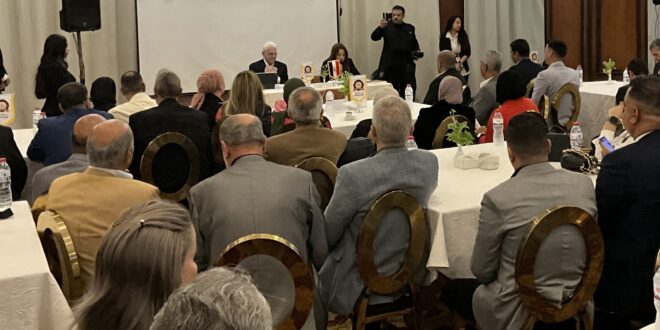In a remarkable event, Dr. Hossam Badrawi gave an engaging and interactive speech at the Safwa Cultural Salon in Port Said, upon invitation from Ms. Lucy Mandour, head of the salon, and in the presence of prominent figures from the governorate and over eighty attendees. His speech covered the following points:
- A warm greeting to the audience.
- A reference to the symbolism of Port Said: the city of resistance, the crossing, and the face of the future.
- Port Said was once the gateway to victory and is now the gateway to hope.
Setting the stage with a central question:
Where is Egypt heading? And what lies ahead?
First: The Challenges
- Unqualified population growth and its impact, along with the regressive Salafi-Ikhwani (Muslim Brotherhood) ideological wave.
- Climate change and water issues: The Nile dilemma and water scarcity scenarios.
- Bureaucracy and management challenges.
- Education and employment: The gap between education outcomes and future life requirements.
- Public debt and wealth distribution.
An optimistic note: All these challenges can be turned into opportunities if we invest in human beings and intellect.
Second: The Opportunities
- Human capital: Egypt’s youth are its greatest treasure.
- Digital transformation and artificial intelligence: A chance for leadership if we invest wisely.
- Egypt’s geographic location: The heart of the world, waterways, and a bridge between continents.
- Investment in renewable energy: Sun, wind, and natural resources.
- Egypt’s soft power: Education, culture, and art.
Third: The Core Message
- Change is possible when political will aligns with public awareness.
- Education is the key, and there is no future without quality education that plants free thinking alongside values.
- Self-confidence is a national necessity. Optimism is not naivety—it’s a conscious decision.
- The future is built by those who believe in it.
Conclusion
“My genes are optimistic, but I also believe optimism is a choice.
We must see the sun even during cloudy moments…
Egypt doesn’t break—she just needs to believe in herself.”
“Egypt As We See It Through Eyes of Hope”
By Hossam Badrawi
Amidst the chaos of challenges, some may think tomorrow is bleak…
But I believe that within every challenge lies an opportunity, and behind every cloud, there’s a light waiting for us to open a window.
I am a genetically optimistic man, yes—but I also know that hope is not just a feeling, it’s a conscious, deliberate act.
We choose to believe. We choose to dream. And we choose to work so that the dream becomes reality.
Egypt is not just a tale of a glorious past, but a project for a magnificent future.
Egypt is its youth, who fill the streets with life; its women, who carry the nation in their hearts, homes, and workplaces; and its minds, which continue to think despite the noise.
Egypt’s future will not happen by chance—it will be shaped by the will of her people, by education that stimulates thought rather than rote memorization, by governance that opens doors instead of closing them, and by a deep belief that this country deserves the best and can achieve it.
Let’s plant in our hearts a seed of optimism that challenges cannot dry out.
And let’s write on the walls of the coming days:
“We saw the light, believed in it, and moved toward it together.”
“To see the best in our country,
To grow its opportunities and make from them a more beautiful future—
This is not naivety,
But a choice.”
“Optimism is not ignoring reality—it’s insisting on changing it.”
The dialogue was deeply interactive, and at the end, Dr. Hossam summarized his recent books. Attendees gathered around him for commemorative photos and to get his signature on their copies.
 Dr. Hossam Badrawi Official Website
Dr. Hossam Badrawi Official Website


